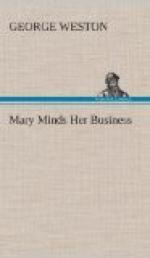“Anything I can do for you, Miss Mary?” he said.
“Then first we must find a place to train the women workers. One of those empty buildings would be best, I think. I’ll give you a list of machines to be set in place.”
The “school” was ready the following Monday morning. For “teachers” Mary had selected a number of elderly men whom she had picked for their quiet voices and obvious good nature. They were all expert machinists and had families.
On Saturday the following advertisement had appeared in the local paper:
A CALL FOR WOMEN
Women wanted in machine-shop to do men’s work at men’s wages for the duration of the war.
No experience necessary. Easier than washing, ironing, scrubbing or sewing. $21 a week and up.
Apply Monday morning, 8 o’clock.
Josiah Spencer & son, Inc.
As you have guessed, Mary composed that advertisement. It hadn’t passed without criticism.
“I don’t think it’s necessary to pay them as much as the men,” Mac had suggested. “To say the least it’s vera generous and vera unusual.”
“Why shouldn’t they get as much as the men if they are going to do men’s work?” asked Mary. “Besides, I’m doing it for the men’s sake, even more than for the women’s.”
Mac stared at that and buttoned his mouth very tightly.
“They have been all through that in Europe,” she explained. “Don’t you see? If a woman can do a man’s work, and do it for less money, it brings down men’s wages. Because who would hire a man at $21 a week after the war if they could get a woman to do the same work for $15?”
“You’re richt,” said Mac after a thoughtful pause. “I must pass that along. I know from myself that the men will grumble when they think the women are going to make as much money as themselves. But when they richtly understand it’s for their own sake, too, they’ll hush their noise.”
Mary was one of the first at the factory on Monday.
“Won’t I look silly, if nobody comes!” she had thought every time she woke in the night. But she needn’t have worried. There was an argument in that advertisement, “Easier than washing, ironing, scrubbing or sewing,” that appealed to many a feminine imagination, and when the fancy, thus awakened, played around the promising phrase “$21 a week—and up,” hope presently turned to desire—and desire to resolution.
“We’ll have to set up more machines,” said Mary to Archey when she saw the size of her first class. And looking them over with a proudly beating heart she called out, “Good morning, everybody! Will you please follow me?”
From this point on, particularly, I like to imagine the eight Josiah Spencers who had gone before following the proceedings with ghostly steps and eyes that missed not a move—invisible themselves, but hearing all and saying nothing. And how they must have stared at each other as they followed that procession over the factory grounds, the last of the Spencers followed by a silent, winding train of women, like a new type of Moses leading her sisters into the promised land!




